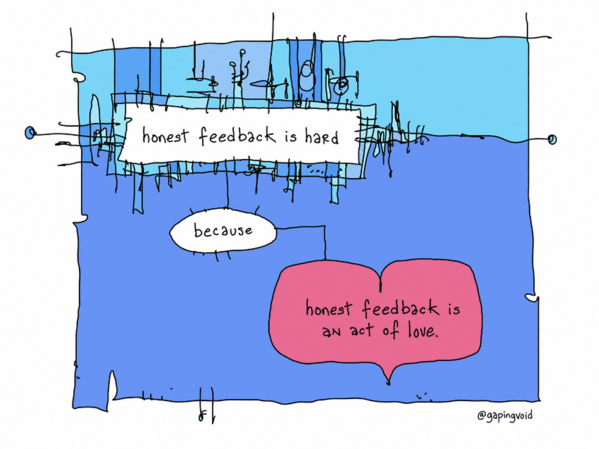Axelerant deliberately strives to be a high-performance-driven organization. At the core of doing so are the human relationships that build mutual respect and trust between us. Through that trust and respect, you can speak without fear to say the things you should say. Especially tough topics because you genuinely care for people successfully acting in Axelerant’s best interest.
Giving and receiving feedback is not easy and takes effort and experiencing mistakes to do well. On top of lessons from Radical Candor, Axelerant follows the Netflix model of giving and receiving feedback.
Giving Feedback
Aim to Assist
You must give feedback with positive intent. Giving feedback to get the frustration off your chest, intentionally hurting the other person, or furthering your political agenda is not tolerated. Clearly explain how a specific behavior change will help the individual or the company, not how it will help you.
“The way you pick your teeth in meetings with external partners is irritating” is wrong feedback. Right feedback would be, “If you stop picking your teeth in external partner meetings, the partners are more likely to see you as professional, and we’re more likely to build a strong relationship.”
Hold blameless postmortem, talk about situation and outcome than person
Own our mistakes
Actionable
Your feedback must focus on what the recipient can do differently.
Wrong feedback is like, “Your presentation is undermining its own messages.” Right feedback is, “The way you ask the audience for input is resulting in only Americans participating.” Even better is like, “If you can find a way to solicit contributions from other nationalities in the room, your presentation will be more powerful.”
Receiving Feedback
Appreciate
Natural human inclination provides a defense or excuse when receiving criticism; we all reflexively seek to protect our egos and reputation.
When you receive feedback, you need to fight this natural reaction and instead ask yourself, “How can I show appreciation for this feedback by listening carefully, considering the message with an open mind, and becoming neither defensive nor angry?”
Be grateful and accepting of feedback.
Ask people to share a recent situation where the feedback applies.
Ask clarifying questions to ensure you understand the core of the feedback.
Consider watching How to receive tough feedback yourself
Validate the courage it took a person to give you feedback or free them to take action.
Accept or Discard
You will receive lots of feedback from lots of people while at Axelerant. You are required to listen and consider all feedback provided. You are not required to follow it.
Say “thank you” with sincerity. But both you and the provider must understand that the decision to react to the feedback is entirely up to the recipient.
Thank people for the feedback.
Talk about possible solutions/changes, or explain the context they need to know.
When you can't change something, help people understand why to provide empathy and tolerance.
When you choose to discard the feedback and your job performance is negatively affected, your termination for just cause is possible. There are no performance improvement plans at Axelerant.
Adapt
Ideas about candor differ greatly around the world. Therefore consideration of the culture within how you deliver and react to feedback greatly impacts your desired results. For example, for less direct cultures, like Japan, you should increase opportunities for formal feedback.
Wherever you go for Axelerant, you should learn to adjust your style and do your best to connect with people in a manner that engages them. For Axelerant to integrate our corporate culture worldwide, you have to be humble, be curious, listen before speaking, and learn before teaching.
With these approaches above, you can’t help but become more effective every day.
